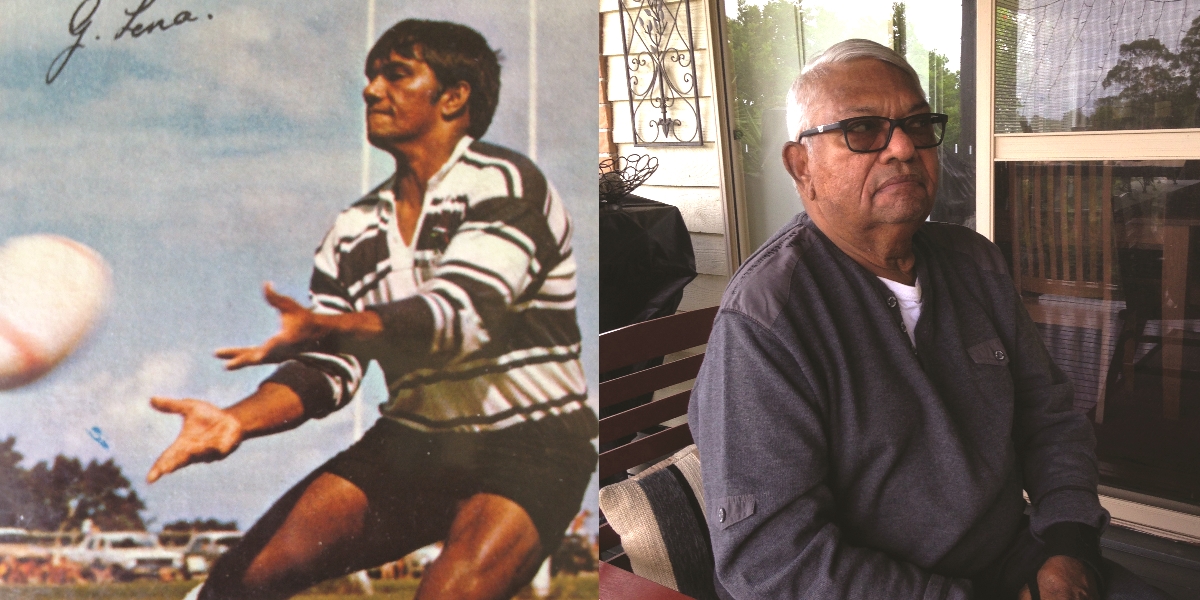Article from Men of League Foundation Magazine – Issue 67 – June 2017
Injury stopped what was looking like a promising career representing Queensland for Graham Lena. He looks back on his career fondly though, and life positively, despite a family tragedy in later years and some challenging health issues now. By Steve Ricketts.
Graham Lena was set for a lengthy career in the maroon of Queensland after his impressive interstate debut at the Sydney Cricket Ground in 1971.
The Courier-Mail’s Jack Reardon wrote that Lena more than held his own against New South Wales’ aggressive five-eighth Tom Raudonikis in a match won 17-15 by the Blues.
But injury intervened in ensuing years, and Lena’s only other appearance in maroon came a week after that SCG clash when Queensland played NSW Country in Newcastle on their way home.
By 1974, aged just 26, Lena’s career was effectively over and he briefly turned his hand to coaching before bowing out of the game altogether.
Lena was always destined to play rugby league, given his father Allan was a star in the strong Tweed league in the 1940s and 50s, and his grandfather Percy had played in the district before that.
Born at Murwillumbah, Graham Lena lived his early years at South Tweed Heads, and among his neighbours were the Morgan family, the most famous of whom, Lionel, was the first indigenous man to play rugby league for Australia when he took the field against the 1960 French tourists.
Graham’s father was of South Sea Island blood and his mother was Aboriginal. Allan worked in the bananas at Glengarrie, high in the hills above the Tweed Valley, right on the Queensland-NSW border.
Allan, who played club football for Tweed All Blacks, represented the Tweed in the prestigious inter-district Anthony Shield competition and was a hero to the Indigenous and Islander community.
When Graham was six, Allan took the family (Graham was one of six children) to Ayr in the Burdekin region of North Queensland because there was a good job going in a sugar mill. Allan continued his league career with the Lifesavers club while Graham came through the grades at Colts, representing Burdekin in the Foley Shield.
News of his impressive form spread as far as Sydney, with Newtown secretary Frank Farrington, who had spent a season in Mackay as a player, making an approach to the 20-year-old.
Lena did not go to Sydney but in 1968 left the north, signing with Toowoomba club, All Whites, where his game was fine-tuned by the likes of Whites’ coach Stan Hick; former Test lock, Ian ‘Ripper’ Doyle (a Toowoomba selector) and Test centre and Toowoomba representative teammate John McDonald.
That year Lena represented Toowoomba against Great Britain. “I played in the centres and marked Alan Burwood, who later went on to play with Canterbury in Sydney,” Lena recalled. “It was one of the toughest games I have ever played [Britain won 28-10]. The Poms would knock your block off as quick as look at you.
“But we all got along after the match. They loved to drink and sing.
“Their coloured winger, Clive Sullivan, encouraged me to give English football a go. ‘We’ll look after you’, he said. But nothing came of it.”
The same year the ‘Downsmen won the coveted Bulimba Cup, beating Brisbane in the final at Lang Park, but next season Lena returned to North Queensland to play at Ingham and represented North Queensland in the state trials in Brisbane.
Former State five-eighth Eric Gelling, who had played in the Burdekin, was coach of Brothers in Brisbane and lured Lena to the Queensland capital. Brothers already boasted skilful halves Johnny Smith and Barry Dowling but Dowling and Lena were capable of playing in the centres.
Brothers made the preliminary finals in A grade, reserves and C grade in 1970 but all three sides lost, with the A grade going down 15-7 to eventual premiers Valleys. Dowling was The Courier-Mail’s best and fairest award winner.
The following season, 1971, was Lena’s finest. Brothers didn’t make the finals but he won The Courier-Mail’s best and fairest award (and with it a cash prize of $200) and played for Brisbane in their Bulimba Cup final win over Toowoomba, and also toured NSW with the Bob Bax-coached Queensland side.
NSW’s 17-15 win at the SCG completed a clean sweep of the series, with the Blues having won the first two games in Brisbane. But there were several positives for Queensland, not least the performance of Lena at five-eighth.
“Lena had a sound game against Raudonikis, and this was probably the most even battle of the match, with Lena losing nothing in comparison,” wrote The Courier-Mail’s Jack Reardon. Raudonikis made his Test debut the following year.
“The quick service of halfback Lee Hutchinson and deft handling by Lena gave centres, Brian Adams and Max Anderson, plenty of attacking opportunities.”
Three days later Lena but was five-eighth when the Maroons played the Arthur Summons-coached Combined NSW Country in Newcastle. Queensland won 19-18, thanks to a last-minute try by centre Adams with Bax rating Lena one of his best.
“The Newcastle fans gave it to us,” Lena said. “I remember them telling us to stick a pineapple up our arse.”
The world was at Lena’s feet, and Sydney clubs were looking his way.
“But the transfer fee imposed on me by the QRL was too big,” Lena said. “As it turned out, I did my cruciate ligament 1972 and then cartilage damage in ’73.
There wasn’t sports medicine then like there is now, and they couldn’t do much for me.
“I kept playing, but I couldn’t perform the way I wanted to.”
Forced to retire in 1974, Lena gained his grade three coaching certificate and coached Brothers’ juniors. But it was difficult putting in the necessary time, given his work and commitments.
He had met his wife, Sandra Gwynne, at a dance at Brothers Leagues Club. Originally from Warwick, she grew up with future Brothers and Broncos coach Wayne Bennett but did not follow rugby league. That changed when she met Graham.
They had three children – Sondra, Andree and Josh.
Sondra was tragically killed near Rockhampton in 1992, when she was struck by a passing vehicle at a roadblock, set up following a prison escape. She was only 20 and was the first Queensland policewoman killed in the line of duty.
Sondra joined the force because she wanted to make a difference, and no doubt she would be proud of her parents and siblings, because they have kept her memory alive and remained a tight-knit family unit, despite the devastation they felt following her death.
Sandra Lena said the Queensland Police Service had never left the family’s side and had supported them ever since Sondra’s death.
Even though Graham is now fighting a battle with pancreatic cancer, he remains upbeat and hopes to continue his work as a community service officer with Brisbane based Roma House, run by Mission Australia.
A brewery truck driver with Carlton and United during his football days and immediately afterwards, Graham later gained the necessary qualifications for him to work with Queensland Health dealing with mental health and alcohol-related problems.
He also has worked as a volunteer counsellor with Lifeline.
Men of League Foundation Wellbeing Officers have visited Graham in hospital and at the family home at Arana Hills in Brisbane’s west and have been knocked over by his positive attitude to life.








